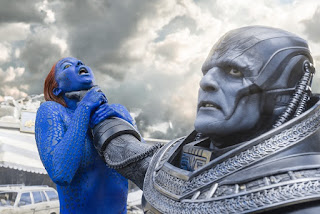When 20th Century Fox’s X-Men:
Apocalypse opened over the Memorial Day weekend, controversy arose over billboards
featuring the arresting image of a ginormous male Marvel Comics character named
Apocalypse gripping the female mutant Mystique by the throat. The image
offended some, such as actress Rose McGowan, who wrote
that “There is a major problem when the men and women at 20th Century Fox think
casual violence against women is the way to market a film.” But McGowan’s complaint
is off the mark, and only underscores the problematic nature of the demand for
onscreen equality of the sexes.
McGowan wasn’t alone; others joined
her in protest of the image. Among others, Jay Edidin from the podcast “Jay
& Miles X-Plain the X-Men” called it “gratuitous” and “offensive in ways
that serve absolutely no purpose.” Devin Faraci at the blog Birth.Movies.Death
agreed: “It’s just an image of a big guy choking out a smaller woman.” Jennifer McCleary-Sills
of the International Center for Research on Women says it’s a reminder of how
violence against women is used by Hollywood as a default and “seen as sexy for
all the wrong reasons.” In a Facebook post to The Hollywood Reporter (THR), McGowan herself wrote
that “[t]here is no context in the ad, just a woman getting strangled.”
That’s not so, however. The clear
context is that the billboard is promoting a superhero film from a Marvel
universe in which super-powered women such as Jennifer Lawrence’s Mystique and
Scarlett Johansson’s Black Widow abound. Besides being fictional, Mystique is
not merely an ordinary woman being strangled by a much stronger man in the
image, which would certainly by disturbing in the context of a different film
genre – say, a drama or thriller. Rather, the dramatic tension stems from the
fact that she is a kick-ass super-mutant up against an even more powerful
supervillain, not that she is the helpless victim of “casual violence against
women.”
The ad may arouse shock or
indignation in some viewers who innately understand that violence against a
woman – even a super-powered one – is morally repugnant, and 20th
Century Fox may be playing on that instinct to stir up an emotional response to
the billboard in order to drive up ticket sales for the movie. But the image
certainly doesn’t send the message that such violence is acceptable or sexy.
The controversy is reminiscent of
the misguided outcry which greeted Pat Benatar’s Top 10 single “Hit Me With
Your Best Shot” back in 1980. An anthem of feminine strength, tenacity, and
fearlessness, the song ironically sparked a massive backlash from feminists who
ludicrously perceived it as encouraging domestic violence against women.
The aforementioned Jennifer McCleary-Sills
told THR that “some might not see [the
ad] as an issue because it is a film about violence… with male and female
characters who are warriors and fighting each other as equals.” Exactly. But McGowan
couldn’t accept the politically incorrect message it seemed to be sending. “Imagine
if it were a black man being strangled by a white man, or a gay male being
strangled by a hetero? The outcry would be enormous.”
Indeed it would, but that outcry,
like McGowan’s, would be hypocritical. Yes, violence against women is a serious
issue in the real world, and the entertainment industry has been known to sexualize
that (horror filmmakers, I’m talking to you); but McGowan’s accusation exposes the
hypocrisy of “identity politics,” the proponents of which view everything
through the distorted lens of class, gender, and race. For them, it is
offensive for Hollywood to show certain demographic groups – women, blacks,
gays – as weak or as victims of violence because, the reasoning goes, those groups
have been historically oppressed and marginalized. Conversely, then, in the
name of justice, fairness, and equality those classes now must be depicted as
strong and heroic, and the only acceptable victims are the supposed historical oppressors:
straight white men.
Despite, or perhaps because of, the
fact that in the real world women generally speaking are not the fighting
equals of men, social justice warriors have long demanded to see female
characters who are the equal of any male in heroism, strength, courage, and
battle skill. Such onscreen equality now exists in films like Mad Max: Fury Road, Star Wars: The Force Awakens, and the Hunger Games trilogy, to name just a few, and Hollywood is no doubt
just getting started. But controversies like this one prove that equality in
the entertainment arena isn’t enough for feminists who want it both ways: they’re
fine with a woman character waging casual violence against men and yet want to claim
victim status when the tables are turned. Sometimes feminists simply don’t know
to quit when they’re ahead.
From Acculturated, 6/8/16
